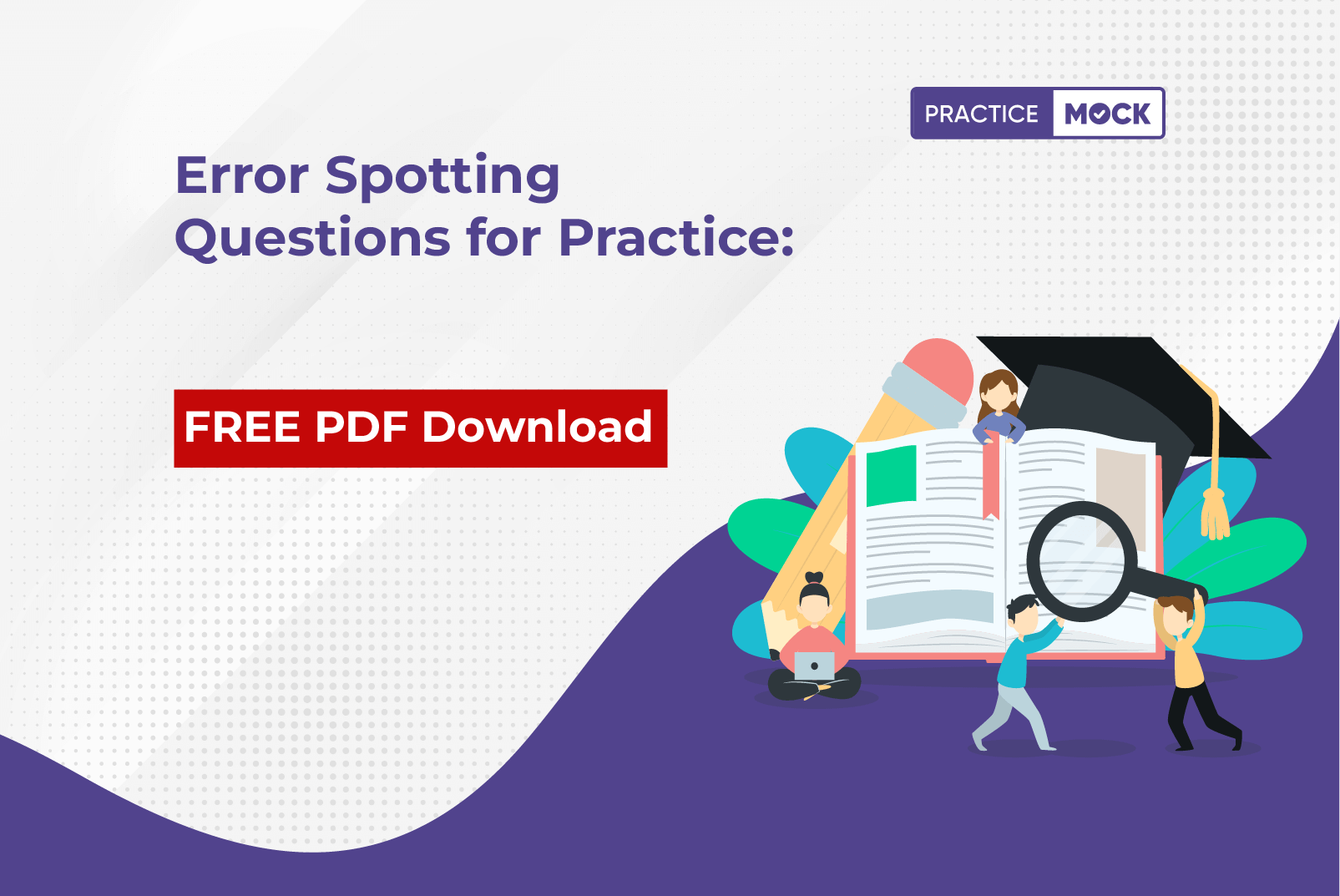Error Spotting Questions for Practice: FREE PDF Download: Are you looking for a way to master the art of error spotting? We’ve got just the thing for you! Download our comprehensive PDF guide that contains 50 carefully crafted practice questions – all for free!
Signup for a FREE Mock Test to Improve your Test Taking Skills!!
Our guide is designed to help you identify common errors and learn how to avoid them. Each question is accompanied by a detailed explanation, giving you all the information you need to improve your skills.
So, whether you’re a student looking to ace your exams or a professional looking to enhance your writing abilities, our guide is the perfect tool to help you achieve your goals. Don’t miss this opportunity to take your error spotting skills to the next level – download our free PDF now!
Click Here to Download: Error Spotting Practice Question FREE PDF
Golden Rules to Solve Error Spotting Questions
Words and Sentences are roots in any language. An error occurring in sentences causes a poor impression among the readers. Apply a systematic way to look for errors making sentences understandable. Here is the list of golden rules to follow to solve Error Spotting questions.
Rule 1: Check & Identify the Part of Speech Used
A Part of the Speech identifies the structure and meaning of a sentence. The eight parts of speech in English Grammar are Noun, Pronoun, Adjective, Interjection, Adverb, and Conjunction.
- A noun is described as naming words like person, place, and thing.
- A word replacing a Noun is a Pronoun.
- An adjective is a word depicting the quality of a Noun.
- Connecting words are known as Conjunction.
- Words describing the relationship between Nouns and Pronouns is Preposition.
Example: Mohan are sleeping.
In this sentence, Mohan is a noun, and are is a pronoun. In a singular sentence, we use it as a pronoun.
Correct Sentence: Mohan is sleeping.
Signup for a FREE Mock Test to Improve your Test Taking Skills!!
Rule 2: Look for the Sentence Type
In English Grammar, there are three types of sentences interrogative, affirmative, and negative sentences. An affirmative sentence is written in the normal form using subject, verb, and object. A sentence containing not in it is known as a negative sentence. Meanwhile, interrogative sentences are those in which question words are used such as why, how, when, and where.
Example: How are sleeping?
Correct Interrogative Sentence: Where are you sleeping?
Rule 3: Check Punctuation Marks Used
Punctuation plays an important role in demonstrating the rhythm of sentences. Check commas, full stops, and question marks are used in the sentence construction to understand its meaning clearly.
Example: How are you.
Correct: How are you?
Rule 4: Identify Singularity and Plurality in Sentences
Sentences occurring in the English language can be singular and plural. Check the nouns used to identify if the sentence is singular or plural.
Example: Many girls is dancing together. (Incorrect)
Correct Sentence: Many girls are dancing together.
Signup for a FREE Mock Test to Improve your Test Taking Skills!!
Rule 5: Check out the Pronouns Used
Look and then, identify the pronouns used in the place of nous in sentence formations. Different pronouns are used replacing nouns multiple times in sentences. Understand sentence structure, meaning, and formation while correcting them.
Example: Sita is a girl. He is reading a book.
Correct: Sita is a girl. She is reading a book.
List of Quick Things to Keep in Mind Approaching Error Spotting Questions
Be cautious with this list of words while approaching Error Spotting questions in the exam:
- Usage of ‘even’ (and not ‘only’) for emphasis
- ‘Back’ with ‘revert’
- Anyway without ‘s’ is correct (‘Anyways’ is nonstandard usage)
- Who and whom
- Few, less and little
- Many and much
- Their, there and they’re
- Your and you’re
- Explain and suggest (as in the difference between explaining her and suggesting her)
- Loose and lose
- ‘comma’ before ‘that’ should be avoided
- Accept, except and expect
- It’s and its
- Since and for
- Usage of ‘were’ in a possible situation
- More and better
- Although and but
Signup for a FREE Mock Test to Improve your Test Taking Skills!!
Takeaway
Error Spotting questions are asked in competitive government examinations to test the grammar knowledge of candidates. Such questions are covered in the English or Verbal Ability section. Mistakes can occur in punctuation, subject-verb agreement, singular-plural, and any other parts of speech. One should stay careful with punctuation and grammar on attempting the Error Spotting questions in the exam.
Also, check: Most Probable ARD Questions for Practice
- Sign Up on Practicemock for Updated Current Affairs, Free Topic Tests and Free Mini Mocks
- Sign Up Here to Download Free Study Material
Free Mock Tests for the Upcoming Exams
- IBPS PO Free Mock Test 2024
- RBI Grade B Free Mock Test 2024
- IBPS SO Free Mock Test 2024
- NABARD Grade A Free Mock Test 2024
- SSC CGL Free Mock Test 2024
- IBPS Clerk Free Mock Test 2024
- IBPS RRB PO Free Mock Test 2024
- IBPS RRB Clerk Free Mock Test 2024
- RRB NTPC Free Mock Test 2024
- SSC MTS Free Mock Test 2024
- SSC Strenographer Free Mock Test 2024
- GATE Mechanical Free Mock Test 2024
- GATE Civil Free Mock Test 2024
- RRB ALP Free Mock Test 2024
- SSC CPO Free Mock Test 2024
- AFCAT Free Mock Test 2024
- SEBI Grade A Free Mock Test 2024
- IFSCA Grade A Free Mock Test 2024
- RRB JE Free Mock Test 2024
- Free Banking Live Test
- Free SSC Live Test



